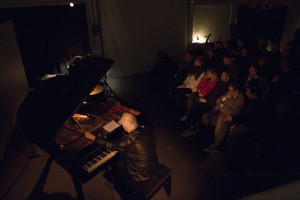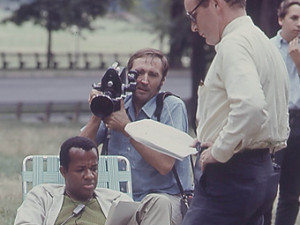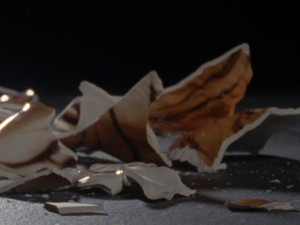
A concert by AMM: John Tilbury and Eddie Prevost
Tuesday 4 December 2012, 7–8pm
AMM – a very short history of a long-lived musical phenomenon
Eddie Prévost (October 2012).
The cloaked acronym AMM is the name of a music improvisation ensemble and the embodiment of a philosophy.
Founded in 1965 by Lou Gare, Eddie Prévost and Keith Rowe and soon after joined by Lawrence Sheaff and Cornelius Cardew, AMM became a unique voice in the burgeoning movement of free improvisation in the 1960s. There are three notable recordings (featuring Cardew) of the period: AMMMUSIC (1966), The Crypt (1968) and the first disc of three (The Aarhus Sequences – 1969) in the 30-year AMM retrospective collection Laminal (1996). These characterise the ensemble’s developing exploratory sound.
What distinguished our approach then, and continues to do so now, can be encapsulated in Cardew’s words:
‘We (AMM) are searching for sounds and for the responses that attach to them, rather than thinking them up, preparing them and producing them.’[1]
This formulation is examined and developed in Edwin Prévost’s The First Concert – An Adaptive Appraisal of a Meta Music, Copula, 2011. This deceptively simple proposition describes the creative shift within our music, moving it away from a compositional or presentational imperative towards an open engagement with things and people.
For AMM, for music to function it has to be open, associative, active, receptive and assertive. This may be where a potential cultural paradigm shift is located within experimental music. From this formulation a new operative and moral focus comes into view. However, such a prospect can only emerge and develop if we follow another of Cardew’s prescient observations and ensure it is:
‘The musician who is at the heart of the experiment.’[2]
Like all human activities and associations, AMM has been subject to disagreements and dislocation. By 1973 Cardew committed himself to radical left-wing political activism. He and Rowe left the ensemble to follow other imperatives. In 1979 there was a short-lived rapprochement – Cardew, Gare, Prévost and Rowe began playing together again. This was essentially cut short by Cardew’s political commitment and Gare’s disillusion with the association.
By 1982 AMM consisted of the trio of Eddie Prévost, Keith Rowe and John Tilbury (an early musical colleague of Cardew) who continued to make music together over the next twenty years or so. There are numerous recordings of this period. Rowe left the ensemble by 2005, leaving John Tilbury and Eddie Prévost who continue the same musical philosophy. There are three recordings of this duo: Norwich (2005), Uncovered Correspondence (2010) that was recorded at a concert given in Jaslo, Poland and Two London Concerts (2011).
Surviving various fractures, AMM is entering its 48th year. Although it has travelled to many parts of the world it remains outside of the programming diet of conventional music promotion and is relatively unknown to a general audience, although (perhaps a little late) we did have a place in the 2012 Festival of New Music in Donaueschingen, Germany.
Musicians of many persuasions, nationalities and generations often reference AMM as an inspirational source of sounds and ideas. The work is ongoing. It leaves a legacy and has a future. One of the aphorisms that attended AMM’s first album reads:
‘AMM started itself. It was there a few minutes before we thought of it.’[3]
One suspects that AMM will somehow continue after those who first thought of it have long since departed.
For details of the CDs and books mentioned above and many other of related examples go to: www.matchlessrecordings.com [www.matchlessrecordings.com]
[1]
p.127, ‘Towards and Ethic of Improvisation’ in Cornelius Cardew: A Reader, Copula, 2006.
[2] Ibid.
[3] CD notes from AMMMUSIC, ReR Megacorp, 1966.
This is an event to accompany the exhibition Beatrice Gibson: The Tiger’s Mind.


